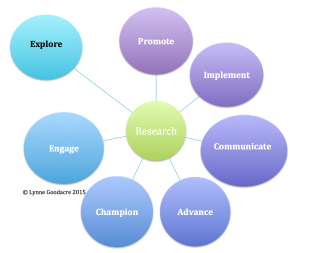 By the time you read this post I hope that you have bought into the idea of what it means, within the context of the EPIC model, to Explore and how this will contribute to your development as an emergent researcher.
By the time you read this post I hope that you have bought into the idea of what it means, within the context of the EPIC model, to Explore and how this will contribute to your development as an emergent researcher.
Exploration in this context is not an onerous process but does require you to set out with a sense of adventure and an open and inquiring mind. It is a brilliant activity for emergent researchers to engage in because as you develop on your research journey the time available for exploration will become more limited.
Think of this as a funneling exercise – start exploring broadly and over time you will understand the connections and networks within the community and identify those of greater interest and relevance enabling you to become more focused.
Your equipment requirements are minimal, access to a smart phone, tablet or computer. The time requirement is flexible. It can be as little as 10-15 minutes on your chosen technology over a cup of coffee or up to an hour to have a conversation. It also doesn’t need to be a solitary activity. If you colleagues are interested in research share the journey and knowledge you glean.
Be courageous. Exploring on the internet, for most of us, presents minimal challenge but when you are required to have conversations with people about research this can be more challenging especially when you are starting out. All kinds of self-doubt can creep in such as, ‘will I say something stupid’ or ‘who am I to ask to meet this leading researcher’. But you know what, people will love your enthusiasm and commitment and generally researchers love talking about research. If you are truly aspirational about becoming more involved in research at some point you will need to step into this space.
Get organised. Develop an approach to organising the information you discover. Talk to any researcher and they will recount stories about finding the most amazing article only to be unable to locate it when it was needed. It may be a paper based portfolio or one of the many online tools. A while ago I was introduced to Pocket and Evernote both of which I now use to keep track of information I discover online, organise and share it.
Use social media. Social media is a great way of not only exploring but also, once you have identified key organisations, or individuals, keeping your finger on the pulse of what is happening.
So where do you start?
Start close to home. How much do you know about the research community within your organisation? Who are the key people driving the research agenda, what are the roles of different members of the R&D team and how can they support you and vica versa. What research seminars or workshops are held? Are there funds you could apply for to support your development? Does your organisation have a research strategy and if so what is in it?
How long is it since you have been into your organisations’ library if it has one? A wealth of knowledge and expertise resides in clinical librarians which, from my experience, is under utilised by healthcare professionals.
How much do you know about the research being undertaken within your clinical team? Have you ever talked with the people involved in research, whether it is someone conducting a clinical trial or a colleague completing a project as part of a masters programme, about what they are doing, how and why they are doing it and what they are finding out?
Academic communities. Who is researching in your area of interest in your local Universities? Explore their websites and look beyond faculties of health and into areas such as design and technology, IT, management, and arts based faculties.
Professional communities. My professional body, the College of Occupational Therapists, offer a range of resources to support OTs with an interest in research including a fortnightly research and development bulletin, funding opportunities via the UK Occupational Therapy Research Foundation, access to an ever-expanding range of ebooks and journals. What does your offer?
The wider research community. All of the major medical research charities outline the scope of their funding, their research strategies and priorities and information for researchers on their websites. Funding opportunities for individuals will range from small travel bursaries and academic fees to awards for doctoral and post-doctoral level study. Get to know the relevant medical research charities for your area of interest. These are invaluable links to develop.
All of the above are just suggestions and I’m sure you will have many of your own.
Exploration will enable you to develop a sense of the research community and how it functions, different parts of its infrastructure and their key agendas and priorities. I guarantee that you will be surprised by what you find and the opportunities and resources which are open to you if you make the effort to venture out. There is no such thing as a closet researcher so time to step out and start exploring.
Thank you for name-dropping clinical librarians! I’ll be using your blog posts in a presentation to AHPs about overcoming the barriers to starting research.
LikeLiked by 1 person
Pleasure Emily I have learnt so much from clinical librarians and feel that AHPs could be using your skills and expertise so much more than they do. Thanks also for mentioning my blog in your presentation.
LikeLike